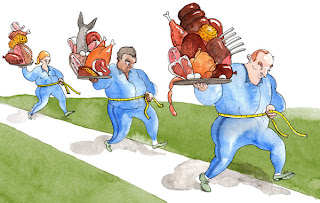Carbohydrates are one of the main dietary components. This category of foods includes sugars, starches, and fiber.
Alternative Names
Starches; Simple sugars; Sugars; Complex carbohydrates; Diet - carbohydrates; Simple carbohydrates
Function
The primary function of carbohydrates is to provide energy for the body, especially the brain and the nervous system. An enzyme called amylase helps break down carbohydrates into glucose (blood sugar), which is used for energy by the body.
Food Sources
Carbohydrates are classified as simple or complex. The classification depends on the chemical structure of the food, and how quickly the sugar is digested and absorbed. Simple carbohydrates have one (single) or two (double) sugars. Complex carbohydrates have three or more sugars.
Examples of single sugars from foods include:
· Fructose (found in fruits)
· Galactose (found in milk products)
Double sugars include:
· Lactose (found in dairy)
· Maltose (found in certain vegetables and in beer)
· Sucrose (table sugar)
Honey is also a double sugar. But unlike table sugar, it contains a small amount of vitamins and minerals. (Note: Honey should not be given to children younger than 1 year old.)
Complex carbohydrates, often referred to as "starchy" foods, include:
· Legumes
· Starchy vegetables
· Whole-grain breads and cereals
Simple carbohydrates that contain vitamins and minerals occur naturally in:
· Fruits
· Milk and milk products
· Vegetables
Simple carbohydrates are also found in processed and refined sugars such as:
· Candy
· Regular (nondiet) carbonated beverages, such as soda
· Syrups
· Table sugar
Refined sugars provide calories, but lack vitamins, minerals, and fiber. Such simple sugars are often called "empty calories" and can lead to weight gain.
Also, many refined foods, such as white flour, sugar, and white rice, lack B vitamins and other important nutrients unless they are marked "enriched." It is healthiest to get carbohydrates, vitamins, and other nutrients in as natural a form as possible -- for example, from fruit instead of table sugar.
Side Effects
· Getting too many carbohydrates can lead to an increase in total calories, causing obesity.
· Not getting enough carbohydrates can cause a lack of calories (malnutrition), or excessive intake of fats to make up the calories.
What Harm Can Excess Carbohydrate Cause?
It is not the fat in the foods we eat but, far more, the excess carbohydrates from our starch- and sugar-loaded diet that is making people fat and unhealthy. If you or people in the family or friend circle are experiencing any of the below mentioned symptoms, the possibility is that may be the excess carbohydrates in your body is responsible for symptoms like gaining weight, fatigue and feeling sleepy all the time, depression, fog like feeling in the brain, low blood sugar, and high blood pressure etc.
It’s a fact that we all need a certain amount of carbohydrates. The carbohydrates that we get through grains, potatoes, sweets and other starchy and sugary foods, is far too much than our we need and body’s capacity to store it. This excess carbohydrate simply gets converted, via insulin, into fat and gets stored in the adipose or fatty tissue.
The foods that are marketed to us are focused too much on bread, cereal, pasta, corn (corn is grain for your information and not a vegetable), rice, potatoes etc. All these have grave consequences on our health. And as if all this was not enough already, that most of these carbohydrates we consume or are marketed to us are available in the form of processed food.
The foods that are marketed to us are focused too much on bread, cereal, pasta, corn (corn is grain for your information and not a vegetable), rice, potatoes etc. All these have grave consequences on our health. And as if all this was not enough already, that most of these carbohydrates we consume or are marketed to us are available in the form of processed food.
All this affects insulin in our body. Insulin is a hormone, which stores the excess calories from carbohydrates in the form of fat. Finally Insulin is responsible for all those bulging stomachs and fat rolls in thighs and chins.
High insulin levels affects functioning of two other important hormones adversely – Glucagons and Growth hormones. These burn fat and sugar and help muscle development. Insulin from excess carbohydrates promotes fat, that deteriorates body’s ability to lose that fat.
The disadvantages of consumption of excess carbohydrate do not end there. Besides the above it also affects our immune system adversely. This leads to allergies and a host of digestive disorders. It can cause depression also. Excess consumption of carbohydrate can also result in life threatening diseases like cancer and diabetes.




No comments:
Post a Comment
Note: Only a member of this blog may post a comment.